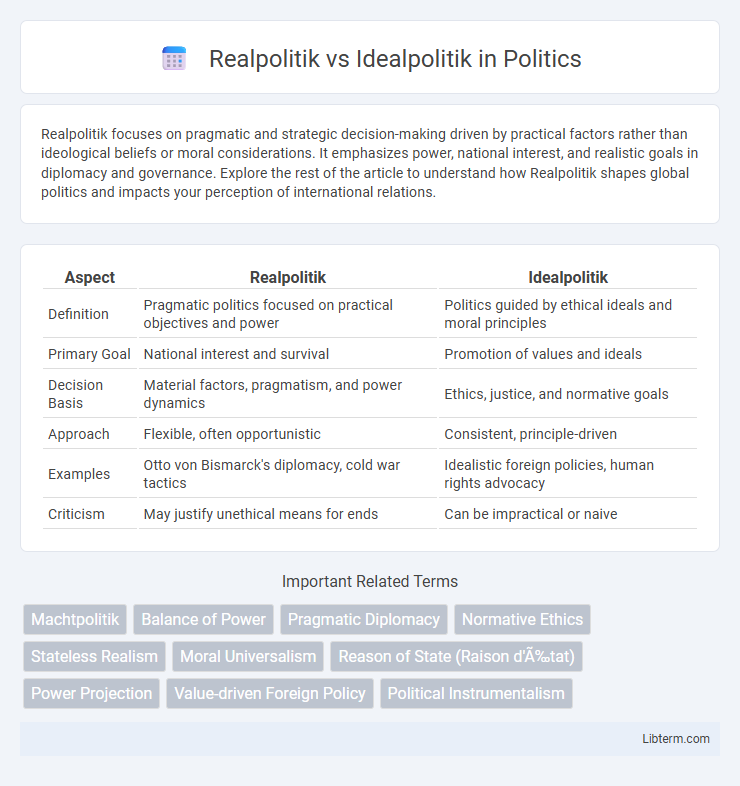Realpolitik focuses on pragmatic and strategic decision-making driven by practical factors rather than ideological beliefs or moral considerations. It emphasizes power, national interest, and realistic goals in diplomacy and governance. Explore the rest of the article to understand how Realpolitik shapes global politics and impacts your perception of international relations.
Table of Comparison
| Aspect | Realpolitik | Idealpolitik |
|---|---|---|
| Definition | Pragmatic politics focused on practical objectives and power | Politics guided by ethical ideals and moral principles |
| Primary Goal | National interest and survival | Promotion of values and ideals |
| Decision Basis | Material factors, pragmatism, and power dynamics | Ethics, justice, and normative goals |
| Approach | Flexible, often opportunistic | Consistent, principle-driven |
| Examples | Otto von Bismarck's diplomacy, cold war tactics | Idealistic foreign policies, human rights advocacy |
| Criticism | May justify unethical means for ends | Can be impractical or naive |
Introduction to Realpolitik and Idealpolitik
Realpolitik emphasizes pragmatic, power-centered policies based on national interest and practical considerations rather than ideological or ethical premises. Idealpolitik prioritizes moral values, ethics, and long-term visionary goals, often aligning foreign policy with principles of justice and international cooperation. These contrasting approaches shape decision-making in diplomacy and governance, framing the balance between realism and idealism in political strategy.
Historical Origins of Realpolitik
Realpolitik, a pragmatic approach to politics grounded in power and practical considerations, originated in 19th-century Europe, particularly through the influence of German statesman Otto von Bismarck. It contrasts with Idealpolitik, which prioritizes moral or ideological principles over practical realities. The historical roots of Realpolitik trace back to the shifting balance of power following the Napoleonic Wars and the Concert of Europe, emphasizing state sovereignty and national interest over ethical ideals.
The Philosophical Foundations of Idealpolitik
Idealpolitik is grounded in normative philosophy, emphasizing moral principles and ethical ideals as the basis for political decision-making. It draws heavily from Kantian ethics, advocating actions aligned with universal duties and human rights rather than mere pragmatic outcomes. This approach contrasts with Realpolitik's focus on power dynamics and practical interests, prioritizing what ought to be done according to moral imperatives over what can be accomplished through strategic power plays.
Key Characteristics of Realpolitik
Realpolitik prioritizes pragmatic and strategic decision-making based on practical objectives rather than ideological or ethical considerations. It emphasizes power, national interest, and the use of diplomacy, coercion, or military force to achieve concrete outcomes. Realpolitik often involves flexible alliances, calculated risks, and an acceptance of the political reality rather than idealistic goals.
Core Principles of Idealpolitik
Idealpolitik centers on guiding foreign policy by ethical principles, human rights, and long-term vision rather than immediate power gains. It prioritizes moral values, diplomatic negotiations, and international law to achieve sustainable peace and global cooperation. This approach often contrasts with Realpolitik's pragmatism by emphasizing idealistic goals over purely strategic interests.
Major Theorists and Influencers
Realpolitik, emphasizing practical and power-centered policies, is closely associated with Otto von Bismarck, whose pragmatic approach to German unification highlighted state interests over ideological goals. Idealpolitik, advocating for moral principles and ethical considerations in foreign policy, finds notable proponents in Woodrow Wilson, whose vision of self-determination and collective security influenced the League of Nations. The contrasting theories underscore the enduring tension between pragmatic statecraft and normative values in international relations.
Real-World Examples of Realpolitik
Realpolitik emphasizes practical and strategic decision-making based on power dynamics, evident in Otto von Bismarck's unification of Germany through war and diplomacy prioritizing state interests over ideology. Another example is Henry Kissinger's detente policy, which balanced U.S. power during the Cold War by engaging with the Soviet Union and China, sidestepping ideological conflicts for geopolitical stability. These cases highlight Realpolitik's focus on pragmatism and power rather than moral or ideological considerations.
Case Studies Illustrating Idealpolitik
Idealpolitik emphasizes policies guided by ethical principles and moral values, prioritizing human rights and international justice even at the cost of national interest. Case studies such as Sweden's stance on humanitarian aid during the Cold War and Germany's post-World War II commitment to international law demonstrate the application of Idealpolitik. These examples reveal how nations pursue ethical foreign policy objectives, promoting global peace and cooperation despite geopolitical challenges.
Advantages and Criticisms of Each Approach
Realpolitik emphasizes pragmatic and strategic decision-making based on power and national interest, offering advantages like realistic policy implementation and adaptability in complex international relations, but it faces criticism for promoting cynicism and neglecting ethical considerations. Idealpolitik prioritizes moral principles and ethical values in foreign policy, advantaging the promotion of human rights and international cooperation, yet it is often criticized for being impractical and vulnerable to exploitation by more opportunistic actors. Balancing Realpolitik's effectiveness with Idealpolitik's ethical aspirations remains a central challenge in modern diplomacy.
The Future of Political Strategy: Balancing Realpolitik and Idealpolitik
The future of political strategy hinges on balancing Realpolitik's pragmatic power dynamics with Idealpolitik's ethical visions to navigate complex global challenges effectively. Policymakers increasingly integrate Realpolitik's emphasis on national interest and strategic alliances with Idealpolitik's commitment to human rights and international norms to achieve sustainable diplomacy. This synthesis promotes adaptive governance, ensuring resilience amid geopolitical shifts while advancing long-term ideological goals.
Realpolitik Infographic

 libterm.com
libterm.com